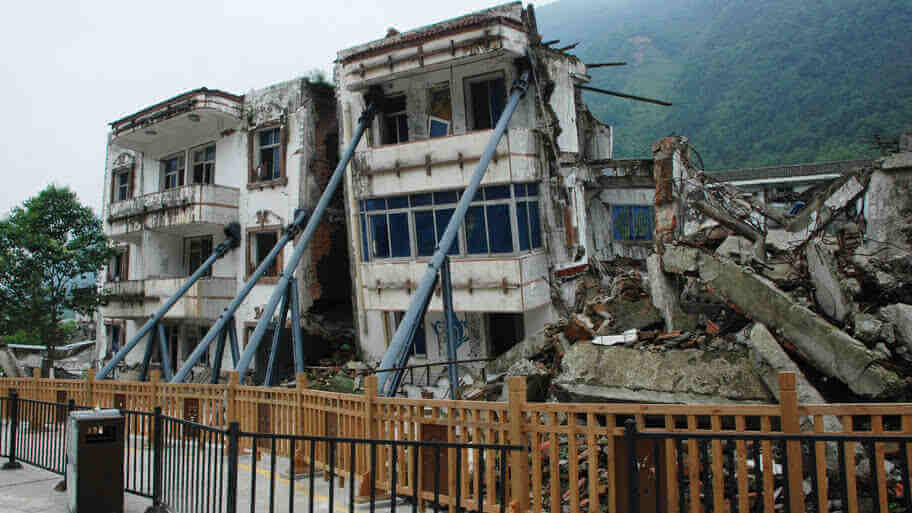Several states face serious risks from earthquakes, yet standard home insurance does not protect your house from the potentially devastating effects of this type of natural disaster. If an earthquake demolishes your home, not only are you out a place to live and your possessions, without a policy in place, you will get no assistance in rebuilding or replacing what was lost.
Fortunately, earthquake insurance is available if you know where to look and you can shop around to find quality coverage that fits your budget.
Everything you need to know to secure your house from earthquake damage is right here in this homeowner’s guide to earthquake insurance.
What Are The Benefits and Downsides to Earthquake Insurance?
Fortunately, there are more advantages to having this insurance than there are detriments. Here are some pros and cons of having earthquake protection for your home:
Pros
-
-
- Covers you if you need to repair or rebuild after an earthquake.
- Costs are a lot lower in states where earthquakes are less frequent.
- Peace of mind, as you know you are protected in a worse case scenario.
- You may receive extra funds to live elsewhere temporarily if your home isn’t livable while repairs are being made.
-
Cons
-
-
- Higher premiums in high risk states.
- High deductible – typically around 5% of the value of your house.
-
Do I Need Earthquake Coverage?
Any state in the US is susceptible to earthquakes, although some areas have them more regularly. If you are in one of those states, you are most likely aware if earthquakes are a common occurrence in your location.
Others can be completely taken by surprise as occasionally human interference such as fracking can cause earthquakes in places that rarely expect this sort of threat.
Whatever the cause, you should do a bit of research on the frequency of earthquakes in your state to determine whether it is prudent for you to acquire coverage. After all, it just takes one earthquake to completely destroy your home, but with insurance, you will be able to rebuild in a worst case scenario.
Here are the situations which are covered by this insurance and also some items which do not fall under this umbrella.
Will cover:
-
-
- Your house and attached parts such as garages
- Personal belongings
- Expenses such as hotel bills if unable to stay at home
- Restoring the land (optional)
- Emergency repair work (optional)
- Upgrades for building code (optional)
-
Will not cover:
-
-
- Sinkhole coverage (can be purchased separately)
- Floods (you will need flood insurance for that)
- Vehicle damage (jurisdiction of auto insurance)
- Fires (should be covered in your homeowner’s insurance)
- Masonry such as brick and stone
-
How Do I Get Earthquake Coverage?
The simplest way to begin is to ask your current home or renter’s insurance provider whether they provide coverage for earthquakes. They may have an add-on to your current policy or perhaps offer standalone earthquake insurance.
You can get Geovera earthquake insurance if you’re in California, Washington, or Oregon.
Arrowhead earthquake insurance is another option, which sells policies from a variety of companies, so is a more diverse option.
Otherwise, your best bet is to shop around, especially if there isn’t a provider in your state that fits your needs. The internet is a great tool for finding companies that either have an add-on or a stand-alone policy and you can often input some details on their website to get an idea of how much this insurance will cost.
How Do I Know How Much Coverage to Get?
Typically, an insurer will set a starting limit of ,000 or 10% of the home’s value, but you may want to raise the amount to ensure that everything is covered and you will not have to worry.
You can have a risk assessment done to determine how much danger there is for you, which will give you a good determination of what is reasonable coverage for your dwelling.
Ultimately, the more you are willing to pay, the more guarantee your home and possession will be protected.
Is Earthquake Insurance Worth It For Renters?
This is the purview of the owner, not you. There’s no need for you to pay the expense of earthquake insurance if you do not own the property. You may be more interested in personal property insurance.
Is Condo Earthquake Insurance Worth It?
If you can’t afford rebuilding your condo without the help of insurance, then getting a policy definitely has value, greater depending on the risk you face for earthquakes due to your location. Peace of mind can certainly make it worth having for many people.
Factors That Determine Your Rate
Just like any type of insurance, there are a multitude of factors that determine what sort of deal you can get to protect your home. Here are some major factors that can come into play when determining your premium:
-
-
- The age of your home
- How many stories your house has
- The cost to rebuild your house
- Your state and zip code
- The type of soil on your property
- Materials used to build your home
- How close you are to fault lines and earthquake potential
-
Deductibles
Earthquake deductibles are generally high, ranging from 10% to 20% of your home’s coverage value. They also use different values to differentiate between the dwelling and your personal property.
Always check with your insurer to see if they have these different deductibles or if they have one, and discover what exactly you will be paying for deductibles.
The Bottom Line
Unless your state requires you to have earthquake coverage, only you can decide whether you want to save your budget or spend the extra money to make sure that if disaster strikes, your home and possessions can be rebuilt or replaced.
Like any type of insurance, there’s an element of risk involved because you might need the insurance and you might not ever use it at all.
Yet when disaster does strike, if you aren’t covered, you can lose far more than you may save by not having coverage for that particular disaster. When you truly need it, the extra cost more than pays for itself.
Featured Image: Megapixl








